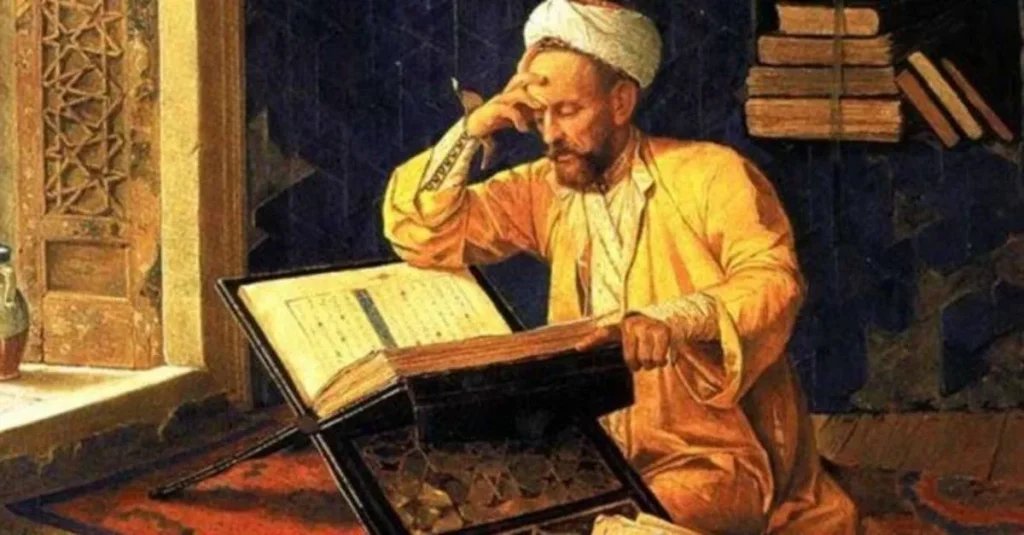
A of portrait of Imam Al-Ghazali
Withdrawal and Seclusion
Imam Al-Ghazali (رحمه الله) practiced withdrawal from public life to focus on spiritual growth [1]. Seclusion strengthened his inner life.
He left teaching and public positions temporarily. This retreat allowed him to reflect deeply on knowledge, ethics, and faith [2].
During seclusion, Al-Ghazali studied the Qur’an and Hadith extensively. He sought purification of heart and sincerity of intention [1].
He also wrote several of his most influential works, including Ihya’ Ulum al-Din. These were inspired by introspection and contemplation [3].
Al-Ghazali’s withdrawal demonstrates the value of solitude. It provides space for self-reflection, ethical refinement, and spiritual clarity [2].
His seclusion was not permanent. He returned to society with renewed purpose, teaching with greater insight and sincerity [1].
In essence, Al-Ghazali balanced engagement and retreat. Solitude nurtured his spirituality, while public service allowed him to guide others [3].
References:
- Al-Ghazali, Deliverance from Error (Al-Munqidh min al-Dalal), 11th century.
- Fakhry, Majid, A History of Islamic Philosophy, Columbia University Press, 2004.
- Hourani, George, Islamic Thought in the Classical Age, Cambridge University Press, 1983.
The Decision to Withdraw
Imam Al-Ghazali (رحمه الله) decided to withdraw from public life to seek spiritual clarity and personal reflection [1].
He felt a need to evaluate his intellectual pursuits. Scholarship alone could not fulfill his spiritual longing [2].
Al-Ghazali faced inner conflict. Despite recognition and high positions, he desired sincerity, humility, and ethical devotion [1].
The decision was gradual. He contemplated the purpose of life and the true meaning of knowledge [3].
He chose seclusion to focus on God, study the Qur’an, and purify his heart [2]. Public duties distracted from his spiritual path [1].
This withdrawal allowed him to reflect deeply and write profound works. Ihya’ Ulum al-Din was inspired by this period [3].
Al-Ghazali’s decision shows the importance of self-assessment. Spiritual growth may require temporary retreat from worldly engagement [2].
Ultimately, his withdrawal was a conscious choice to balance worldly duties with spiritual fulfillment. It transformed both his life and legacy [1].
References:
- Al-Ghazali, Deliverance from Error (Al-Munqidh min al-Dalal), 11th century.
- Fakhry, Majid, A History of Islamic Philosophy, Columbia University Press, 2004.
- Hourani, George, Islamic Thought in the Classical Age, Cambridge University Press, 1983.
The Philosophy of Silence and Solitude
Imam Al-Ghazali (رحمه الله) valued silence and solitude as essential for spiritual clarity [1]. It nurtures inner peace.
He believed constant speech and social interaction may distract from reflection and devotion [2]. Silence strengthens mindfulness and focus.
Solitude provides space for self-examination. Al-Ghazali used it to assess intentions and purify the heart [1].
He practiced withdrawal periodically. During these times, he devoted himself to prayer, study, and contemplation [3].
Silence and solitude also encouraged humility. They reminded him of human dependence on God and transient worldly life [2].
Through solitude, Al-Ghazali developed deeper understanding of ethics, spirituality, and moral responsibility [1]. Knowledge was paired with personal growth.
His philosophy shows that retreat from noise and distraction enables true reflection. Inner awareness flourishes in quiet [3].
In essence, silence and solitude are tools for spiritual refinement. Al-Ghazali’s example guides seekers toward self-discipline and ethical living [2].
References:
- Al-Ghazali, Deliverance from Error (Al-Munqidh min al-Dalal), 11th century.
- Fakhry, Majid, A History of Islamic Philosophy, Columbia University Press, 2004.
- Hourani, George, Islamic Thought in the Classical Age, Cambridge University Press, 1983.
The Importance of Quiet Reflection
Imam Al-Ghazali (رحمه الله) emphasized quiet reflection as a vital practice for spiritual awareness and personal growth [1].
He taught that life’s distractions often prevent true understanding of oneself and God [2]. Reflection allows clarity of purpose.
Quiet reflection encourages self-examination. Al-Ghazali recommended evaluating actions, intentions, and moral conduct regularly [1].
Through reflection, individuals can identify weaknesses such as pride, envy, and greed [3]. Awareness of faults enables ethical improvement.
Al-Ghazali connected reflection with knowledge. Intellectual learning is incomplete without contemplation and inner understanding [2].
Regular periods of silence and reflection cultivate patience, humility, and gratitude [1]. These virtues strengthen character and ethical behavior.
He also viewed reflection as a means to deepen devotion. Thinking about God’s presence nurtures sincerity in worship [3].
In essence, quiet reflection bridges knowledge, ethics, and spirituality. Al-Ghazali’s guidance shows it is essential for moral and spiritual growth [2].
References:
- Al-Ghazali, Deliverance from Error (Al-Munqidh min al-Dalal), 11th century.
- Fakhry, Majid, A History of Islamic Philosophy, Columbia University Press, 2004.
- Hourani, George, Islamic Thought in the Classical Age, Cambridge University Press, 1983.






